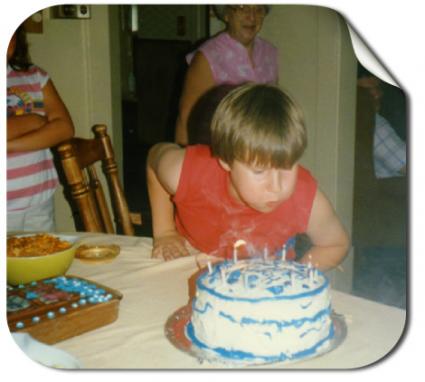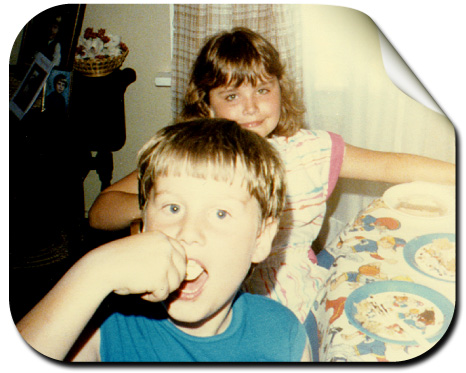Future Now
The IFTF Blog
Facebook has 7 days to connect behavior change and interface design.

I've long been interested in the persuasive potential of even the smallest interface decisions—when one click becomes clicking plus scrolling plus scanning & seeking how many people suddenly don't bother? (and what about the reverse, when interface makes it easy and we still lapse? How long before we all stopped mindlessly clicking to donate bags of rice?) Stanford professor BJ Fogg's class on the persuasive potential of Facebook was a groundbreaking contribution towards this. Sure enough I'm not the only one thinking about the specific connection between interface and birthdays, and my friend's response definitely made my DayQuil-fueled morning. He sent me a seemingly mock e-card done up in the style of Someecards.com, a service that offers sentiments far more relevant to Facebook-era college-age occasions, situations, and senses of humor than a traditional greetings card company could get away with (Someecards offers 34 cards with the word 'Facebook' in the message).
Here's the parody card he sent, the first case of "interface humor" I've seen:

Finally I'd found my excuse-making people! In the months since the Facebook redesign I've had too many opportunities to express this exact remorse. The popularity of Facebook profiles has created an unparalleled one-stop-shop repository of personal information about our social network—automatically—without us needing to ask or input. When intelligently filtered and delivered just-in-time, these details empower even the laziest or most forgetful among us to interpersonally shine. Whereas I used to forget a birthday until the first bite of cake, that tiny-but-unmissable Events tab formerly at the top of the page transformed me into birthday-wishing superhero (arguably, a limited superpower). I could even send a buon compleanno to that one guy I met at that one conference that one time—a formerly weak and fleeting tie taking on some strong-tie characteristics. And if you haven't been on the receiving end of a Facebook birthday, nothing strokes your ego like waking up to more birthday wishes by 10 am than you heard all during childhood.
(Which brings me to the 7-day timeline and a confession. I'm not appealing to my Facebook contact for the greater good of online civility and harmonious, 21st century friendships. My own 31st birthday is next Thursday the 18th, and I'll be damned if I let someone else's interface decisions get in the way of my one day of unbridled online joy.)
There's never been an online network as large as Facebook or as present in, even formative of, our offline culture. Those 34 distinct "Facebook" greetings from Someecards all target some real and often not insignificant micro-event that widespread Facebook usage has newly created, typically skewing younger (for now) but certainly not trending away. I'd bet that a vast majority of 21 year-olds understand what each of those Facebook e-cards means and precisely when to send, even if the sentiments expressed are more akin to gibberish to the rest of us. And while the cynical mock holidays like Mother's Day as artificial events "manufactured" by the greeting card-confectionary complex, how soon before it's not enough to send a tongue-in-cheek e-card after a friend changes relationship status on Facebook, when that response is considered unthoughtfully lacking? In a few years, and reality for many today, toggling that relationship switch will be as mainstreamly monumental as sending engraved invitations, it will automatically catalyze & facilitate related micro-transactions, and it will mean big bucks, for someone.
Even though you'd think this pervasive online-offline monoculture would be good news for Facebook, IFTF friend and media commentator Doug Rushkoff wonders if it could be the beginning of their end. He writes about the growing openness of the service prompted by tomorrow night's first-come-first serve opportunity to pick your own moniker for a publicly web-accessible version of your currently-cloistered Facebook profile. But Doug questions this strategy. What if even a simple eye-hook on the Facebook door is enough separation from the rest of the web for maintaining a profile there to matter? Doug asks:
Now that we'll be quickly findable via Google, what's left to distinguish this social-networking site from the social network that is… the Internet? Moreover, by turning Facebook pages into real Web pages, the company reveals to its users just how close to the real Internet they've been all along, while removing the last few illusory boundaries between the mini-universe of Facebook pages and the greater ecosystem of the Net.
But back to the bottom-line in all of this: Thursday, June 18 (does the <blink> tag still work?) I'm just shy of 300 friends on Facebook; maybe we could somehow redesign only their homepages next week? Let's talk, Facebook. Call or poke me.

In pseudo-jest I contacted a friend at Facebook requesting a redesign of the service's dashboard-modeled homepage: please display upcoming birthdays and events at the top of the page. This change would actually be a restoration. Birthday notifications used to sit up top, before the recent and somewhat infamous redesign of the Facebook homepage moved it from an algorithmically curated snapshot of your friend network towards a more Twitter-like real-time stream of friends' activities and postings. So now, knowing when to write virtual birthday graffiti on a friend's profile requires users to scroll down "below the fold" and look for a static tab called Events. Easy enough to do, sure, but Facebook's moves towards zeitgeisty timeliness make even this small effort less likely. Your Facebook homepage can now refresh itself with any updates from friends written in the minutes (or seconds) since you last checked and these appear smack dab at the top. This convenience all but eliminates the need to scroll down "below the fold" for anything relegated to this dusty no-man's land. After all, if a friend's update has already been pushed off screen by hotter and newer activity, even scrolling is too much work for its depreciated value.



